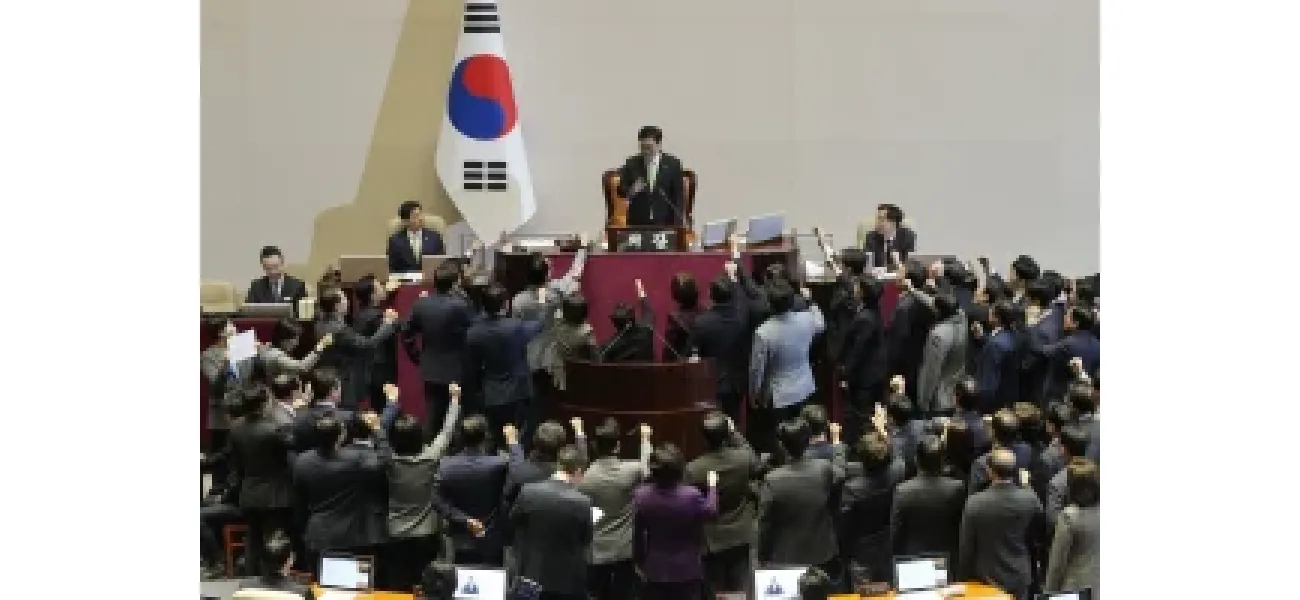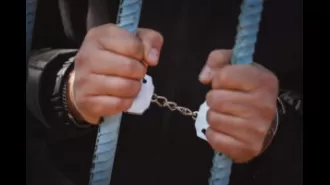National Assembly of South Korea votes to remove Acting President Han after opposition takes control.
South Korea's opposition-controlled National Assembly impeaches acting President Han Duck-soo, causing further turmoil after President Yoon Suk Yeol's martial law and impeachment.
December 27th 2024.

The political turmoil in South Korea has reached a new level as the National Assembly, controlled by the Opposition, voted to impeach acting President Han Duck-soo. This decision, which was met with strong opposition from governing party lawmakers, comes on the heels of President Yoon Suk Yeol's shocking imposition of martial law and subsequent impeachment.
Han's impeachment means that he will temporarily lose his powers and duties as president until the Constitutional Court makes a decision on whether to dismiss or reinstate him. However, this is not the only impeachment that the court is currently reviewing, as they are also considering Yoon's previous impeachment. These back-to-back impeachments of the country's top two officials have only added to the political chaos, causing economic uncertainty and damaging the country's international reputation.
The motion to impeach Han was passed with a 192-0 vote in the single-chamber National Assembly. However, lawmakers from the governing People Power Party chose to boycott the vote and instead gathered around assembly Speaker Woo Won Shik, demanding his resignation and declaring the vote as "invalid". Fortunately, there were no reports of violence or injuries.
The PPP lawmakers protested after Woo announced that a simple majority was needed for Han's impeachment to pass, rather than the two-thirds majority claimed by the PPP. In South Korea, most officials can be impeached with a simple majority, but the president requires two-thirds support. However, there are no specific laws regarding the impeachment of an acting president.
Han's powers will officially be suspended once he receives copies of his impeachment document and the Constitutional Court makes their decision. In the meantime, the deputy prime minister and finance minister, Choi Sang-mok, will take over his duties. Han, who was appointed as prime minister by Yoon, stepped in as acting president after Yoon's impeachment two weeks ago. However, he quickly faced opposition from the main liberal Opposition Democratic Party as he pushed back against their efforts to fill vacant seats on the Constitutional Court, launch an independent investigation into Yoon's martial law decree, and pass pro-farmer bills.
The main issue at hand is the Democratic Party's demand for Han to approve the assembly's nominations of three new Constitutional Court justices. This would restore the court's full nine-member bench ahead of their ruling on Yoon's impeachment. This is a sensitive matter, as a decision to dismiss Yoon as president requires the support of at least six justices. Adding more justices could increase the chances of Yoon's removal. However, Yoon's political allies in the governing People Power Party are against the appointment of these three justices, arguing that Han should not exercise presidential authority while Yoon is still in office.
In response to these tensions, Han stated that he would not appoint the justices without bipartisan consent. Nevertheless, the Democratic Party, which holds a majority in the assembly, submitted an impeachment motion against Han and passed bills calling for the appointment of the three justices.
Meanwhile, investigative agencies in South Korea are looking into potential charges of rebellion and abuse of power against Yoon for his martial law decree. Several of his top military officials have already been arrested for deploying troops and police officers to the National Assembly, resulting in a dramatic standoff that ended with lawmakers entering the chamber and unanimously voting to overturn Yoon's decree.
Han's impeachment means that he will temporarily lose his powers and duties as president until the Constitutional Court makes a decision on whether to dismiss or reinstate him. However, this is not the only impeachment that the court is currently reviewing, as they are also considering Yoon's previous impeachment. These back-to-back impeachments of the country's top two officials have only added to the political chaos, causing economic uncertainty and damaging the country's international reputation.
The motion to impeach Han was passed with a 192-0 vote in the single-chamber National Assembly. However, lawmakers from the governing People Power Party chose to boycott the vote and instead gathered around assembly Speaker Woo Won Shik, demanding his resignation and declaring the vote as "invalid". Fortunately, there were no reports of violence or injuries.
The PPP lawmakers protested after Woo announced that a simple majority was needed for Han's impeachment to pass, rather than the two-thirds majority claimed by the PPP. In South Korea, most officials can be impeached with a simple majority, but the president requires two-thirds support. However, there are no specific laws regarding the impeachment of an acting president.
Han's powers will officially be suspended once he receives copies of his impeachment document and the Constitutional Court makes their decision. In the meantime, the deputy prime minister and finance minister, Choi Sang-mok, will take over his duties. Han, who was appointed as prime minister by Yoon, stepped in as acting president after Yoon's impeachment two weeks ago. However, he quickly faced opposition from the main liberal Opposition Democratic Party as he pushed back against their efforts to fill vacant seats on the Constitutional Court, launch an independent investigation into Yoon's martial law decree, and pass pro-farmer bills.
The main issue at hand is the Democratic Party's demand for Han to approve the assembly's nominations of three new Constitutional Court justices. This would restore the court's full nine-member bench ahead of their ruling on Yoon's impeachment. This is a sensitive matter, as a decision to dismiss Yoon as president requires the support of at least six justices. Adding more justices could increase the chances of Yoon's removal. However, Yoon's political allies in the governing People Power Party are against the appointment of these three justices, arguing that Han should not exercise presidential authority while Yoon is still in office.
In response to these tensions, Han stated that he would not appoint the justices without bipartisan consent. Nevertheless, the Democratic Party, which holds a majority in the assembly, submitted an impeachment motion against Han and passed bills calling for the appointment of the three justices.
Meanwhile, investigative agencies in South Korea are looking into potential charges of rebellion and abuse of power against Yoon for his martial law decree. Several of his top military officials have already been arrested for deploying troops and police officers to the National Assembly, resulting in a dramatic standoff that ended with lawmakers entering the chamber and unanimously voting to overturn Yoon's decree.
[This article has been trending online recently and has been generated with AI. Your feed is customized.]
[Generative AI is experimental.]
0
0
Submit Comment





